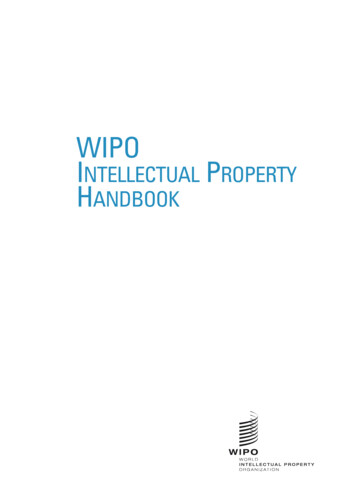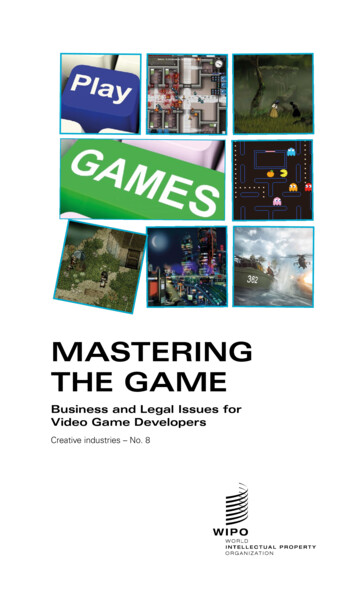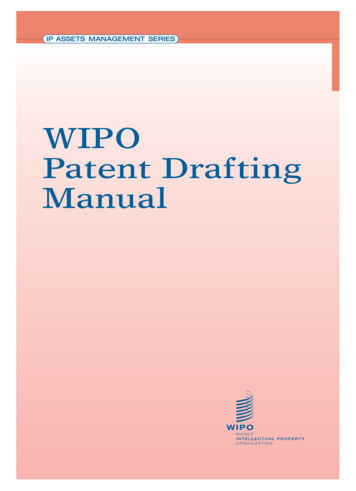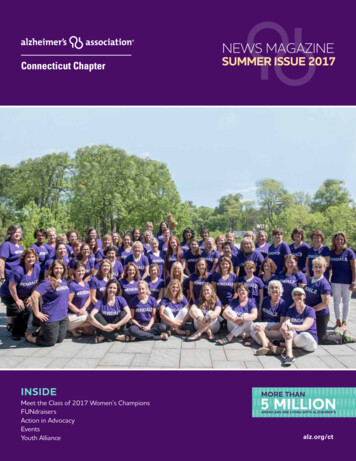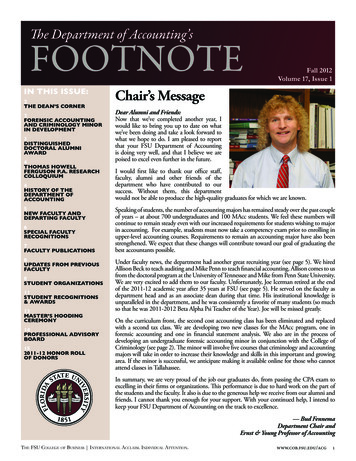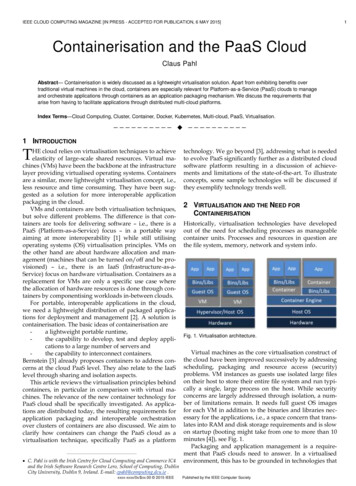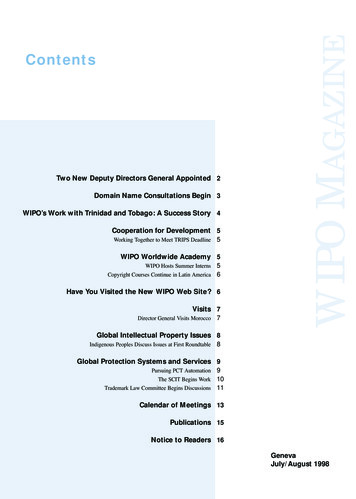
Transcription
Two New Deputy Directors General Appointed 2Domain Name Consultations Begin 3WIPO’s Work with Trinidad and Tobago: A Success Story 4Cooperation for Development 5Working Together to Meet TRIPS Deadline5WIPO Worldwide Academy 5WIPO Hosts Summer InternsCopyright Courses Continue in Latin America56Have You Visited the New WIPO Web Site? 6Visits 7Director General Visits Morocco7WIPO MAGAZINEContentsGlobal Intellectual Property Issues 8Indigenous Peoples Discuss Issues at First Roundtable8Global Protection Systems and Services 9Pursuing PCT AutomationThe SCIT Begins WorkTrademark Law Committee Begins Discussions91011Calendar of Meetings 13Publications 15Notice to Readers 16GenevaJuly/August 1998
2WIPO MAGAZINE - JULY/AUGUST 1998Two New Deputy Directors General AppointedPhoto: Mercedes Martínez DozalTwo new Deputy Directors General and four new directorswere appointed, following the 41st session of the Coordination Committee on July 6-7.Mr. Roberto Castelo,Deputy Director GeneralPhoto: Mercedes Martínez DozalMr. Roberto Castelo is the new Deputy Director Generalresponsible for WIPO’s Cooperation for Development Program, as well as the Worldwide Academy and the Promotionof Innovation Program. He is a national of Brazil whojoined WIPO in 1996 following 12 years in various UnitedNations organizations.Mr. Shozo Uemura, a national of Japan, comes to WIPO fromthe Japanese Patent Office, where he was Director General ofthe Fourth Examination Department and International Affairs.In his new position as Deputy Director General, he will beresponsible for the progressive development of internationalintellectual property law.Four new directors were also appointed :Mr. Shozo Uemura,Deputy Director GeneralMr. Herman Ntchatcho (Cameroon)Human Resources ManagementMr. Inayet Syed (Canada)Information TechnologyMr. Richard Wilder (United States of America)Non-Governmental AffairsMr. Joachim Bilger (Germany)ControllerWIPO Magazine is published monthly by the Office of Global Communications and Public Diplomacy, WorldIntellectual Property Organization(WIPO). It is not an official recordand the views expressed in individualarticles are not necessarily those ofWIPO.The Magazine is distributed freeof charge.If you are interested in receivingcopies, contact:Publications OfficerWIPO34, chemin des ColombettesP.O. Box 18CH-1211 Geneva 20Switzerlandphone: 41 22 338 91 11fax: 41 22 733 54 28e-mail: wipo.mail@wipo.intFor comments or questions, contact:The EditorWIPO Magazine(at the above address)Copyright 1998 World Intellectual Property OrganizationAll rights reserved. Articles contained herein may bereproduced for educational purposes. No part may, however, be reproduced for commercial purposes without theexpress written consent of the Office of Global Communications and Public Diplomacy, World Intellectual PropertyOrganization, P.O. Box 18, CH-1211 Geneva 20, Switzerland.
3WIPO MAGAZINE - JULY/AUGUST 1998Domain NameConsultations BeginWIPO has launched internationalconsultations to develop recommendations for the intellectualproperty issues associated withInternet domain names, includingdispute resolution. The recommendations resulting from theseconsultations, known officially asthe WIPO Internet Domain NameProcess, will be made available tothe non-profit organization that isbeing formed to manage the technical and policy aspects of theInternet domain name system(DNS).Domain names are the “addresses”of computers connected to theInternet, for example, WIPO’sdomain name is wipo.int. Theseaddresses allow users to sende-mails and visit web sites in everycorner of world. The organizationand management of the DNS havebeen intensely debated over thepast two years, as the use of Internet has exploded. The WIPO consultations are motivated by adesire to ensure that the management of the DNS is institutionalized in a way that permits the system to accommodate the growingvolume of traffic on the Internet,while providing competitive andopen administration that considersthe interests of all Internet stakeholders.One of the important issues considered in the course of these discussions is the relationshipbetween domain names and trademarks. While domain names wereoriginally intended to be a way toconnect computers on the Internet, domain names have become aform of business identifier,because they are easy to rememberand use. Businesses have startedto realize the significant potentialof web sites as a primary means offacilitating electronic commerce.By using trademarks as theirdomain names, businesses hope toattract potential customers to theirweb sites, increase their marketvisibility, and their sales and profits. Domain names are now usedFor more information about the Internet Domain Name Process visit,http://wipo2.wipo.intConsultations are scheduledin the following locations:San Francisco, USABrussels, BelgiumWashington D.C., USACairo, EgyptMexico City, MexicoAsuncion, NorthernMariana IslandsTokyo, JapanHyderabad, IndiaSydney, AustraliaCape Town, South AfricaBudapest, Hungaryroutinely in business advertising toindicate accessibility via the Internet.As the Internet has grown, however,domain names have increasinglycome into conflict with trademarks. The possibility of suchconflict arises from the lack ofconnection between the systemfor registering trademarks, on theone hand, and the system for registering domain names, on theother hand. While the trademarkregistration system is administered by a public (governmental)authority on a territorial (eithernational or regional) basis, providing rights to the trademarkholder within the territory, theDNS is usually administered bya non-governmental organizationwithout any functional limitation:domain names are registered ona first-come, first-served basisand offer a unique, global presence on the Internet. The differences in these two registrationsystems have been exploited byindividuals or groups who seizethe opportunity to register thetrademarks of other persons orenterprises as domain names forthemselves ("cybersquatting").[Continued on page 6, col. 3]
4WIPO MAGAZINE - JULY/AUGUST 1998WIPO’s Work withTrinidad and Tobago:A Success StoryWIPO’s program on cooperationfor development provides, whenever possible, assistance with thespecial needs and requirements ofindividual countries. One of thesuccess stories of this approachhas been WIPO’s cooperationwith the Government of Trinidadand Tobago.In 1994, the Government ofTrinidad and Tobago designed,with the technical assistance ofWIPO, a policy that would ensurethe regulation and enforcement ofintellectual property rights. Thispolicy acknowledged not only theimportance of intellectual property rights in a country’s economicdevelopment, but also createdincentives and opportunities forefficient foreign and nationalinvestments.WIPO worked with Trinidad andTobago to develop a comprehensive approach to public and pri-vate management of intellectualproperty, which included: a framework for intellectualproperty in line with international standards, including theWIPO-administered treatiesand the Agreement on theTrade-Related Aspects of Intellectual Property Rights(TRIPS); the development of efficientadministration and enforcementof intellectual property rights; a plan to promote public awareness of the important role ofintellectual property and the useof industrial property information; and the establishment of cooperation links with other developingcountries.The Government of Trinidad andTobago launched and funded theproject, the first of its kind in theCaribbean region, and WIPOworked on its implementationfrom 1994 through 1996. By working together, WIPO and the Government achieved remarkableThe Director General of WIPO, Dr. Kamil Idris, the Honorable PrimeMinister of Trinidad and Tobago, Mr. Basdeo Panday (right) togetherwith the Minister of Legal Affairs, Ms. Kamla Persad-Bissessar(background, center).results in all areas included in themodernization of the legal andadministrative framework for intellectual property.During implementation, the government undertook, with the assistance of WIPO, a thorough revision of the intellectual propertylegislation then in force to modernize it and make it compatiblewith the international obligationsaccepted by the country. As aresult, the Parliament enacted thefollowing laws: The TrademarkAmendment Act (1996), ThePatent Act (1996), The IndustrialDesigns Act (1996), the Act forthe Protection Against UnfairCompetition (1996) and The Copyright Act (1997).At the same time, the countryincreased its membership in intellectual property treaties, becomingthe country of the Americas participating in the greatest numberof WIPO-administered treaties.Already party to the Paris Convention, the WIPO Convention,the Berne Convention, the Convention for the Protection of Producers of Phonograms, Trinidadand Tobago became party in 1994to the Patent Cooperation Treatyand the Budapest Treaty on theInternational Recognition of theDeposit of Microorganisms for thePurposes of Patent Procedure. In1996, it joined the four international treaties establishing international classifications for industrialproperty elements: the StrasbourgAgreement Concerning the International Patent Classification, theNice Agreement Concerning theInternational Classification ofGoods and Services for the Purposes of the Registration ofMarks, the Vienna AgreementEstablishing an InternationalClassification of the FigurativeElements of Marks, and theLocarno Agreement Establishing[Continued on page 7, col. 3]
5WIPO MAGAZINE - JULY/AUGUST 1998Cooperationfor Development2000, deadline—less than 18months away—for conforming withthe WTO Agreement on TradeRelated Aspects of IntellectualProperty Rights (TRIPS).Working Together toMeet TRIPS DeadlineWIPO and WTObegin joint projectThe two organizations will assistcountries to bring their laws oncopyright, patents, trademarks, andother areas of intellectual propertyinto line with the Agreement, andprovide effective enforcement oflaws to deal with piracy, counterfeitgoods, and other forms of intellectualproperty rights infringements.WIPO and the World Trade Organization (WTO) have begun ajoint project to provide technicalassistance to developing countries.The initiative will help developingcountries which are members ofthe WTO to meet the January 1,WIPOWorldwide AcademySwitzerland, and the United Statesof America were selected on thebasis of their academic achievements. The interns were assignedto various offices and departmentswithin WIPO, where they spenttime getting hands-on experienceFor the first time in its history,WIPO organized a SummerInternship Program as part of thetraining developed by the WIPOWorldwide Academy. The program provided an opportunity forstudents and young professionalsto experience the Organization’swork and gain first-hand knowledge of current intellectual property issues.By working together, WIPO andthe WTO, along with the countriesrequesting assistance and (whereappropriate) donor countries, willmaximize use of availableresources in the coming criticalperiod by improved planning andcoordination of technical cooperation activities. and doing research on variousintellectual property topics.At the end of the six-week period,the interns presented the results oftheir research to the group. Without exception, the interns foundtheir time at WIPO to be fulfilling,challenging, and fun. They allmentioned the friends they hadmade, the excellent mentoring theyreceived, and the real work thatthey accomplished. In response,Photo: Paula CoupeWIPO Hosts SummerInternsIn July, the Directors General ofthe two organizations, Dr. KamilIdris of WIPO and Mr. RenatoRuggiero of the WTO, sent jointcommunications to the ministersof each of the developing countriesconcerned to inform them of theinitiative. The communicationunderscored the two organizations’ commitment to help developing countries comply with theTRIPS Agreement on time.Twelve candidates from Algeria,Chile, Cote d’Ivoire, Denmark,France, Israel, Peru, United Republic of Tanzania, Saudi Arabia,Participants and WIPO officials during the first WIPO Summer Internship Program.
6WIPO MAGAZINE - JULY/AUGUST 1998Deputy Director General, Mr.Roberto Castelo, pledged to continue supporting this new programin the years to come.Copyright CoursesContinue in LatinAmericaHavana, Cuba, was the site of thelatest WIPO Regional AcademicCourse on Copyright and Neighboring Rights for Latin America. Itwas the most recent in a series ofcourses on copyright for the regionthat have continued uninterruptedfor 15 years. However, this coursewas just a little different. It was thefirst to be organized by the WIPOWorldwide Academy.The nine-day course was conducted in cooperation with the CubanCopyright Center (CENDA), withthe assistance of the GeneralAuthors’ Society of Spain(SGAE). The Minister of Cultureof Cuba opened the event, whichfeatured a variety of experts, 12guest speakers from differentLatin American countries, Spain,and Switzerland, as well as WIPOofficials. The program focused primarily on the consequences ofaccession by a member of theWorld Trade Organization to theBerne Convention for Literary andArtistic Works. Each subject onthe program included a series ofquestions focusing on the mostsalient issues that were clarified inthe form of an open dialogue withthe audience.The event attracted 160 participants from 18 countries in theregion. In addition to governmentofficials, judges, public prosecutors, and university students, individuals from the private sectoralso attended.Other countries that have hostedWIPO copyright course since1983 include:Argentina, Brazil, Chile,Columbia, Costa Rica, theDominican Republic, Ecuador,Guatemala, Mexico, Panama,Paraguay, and Peru. Have You Visited theNew WIPO Web Site?In August 1998, more than 100,000 pages of information were transferredvia the WIPO web site every week, http://www.wipo.int[Continued from page 3]Conflicts between domain namesand trademarks
vention for the Protection of Pro-ducers of Phonograms, Trinidad and Tobago became party in 1994 to the Patent Cooperation Treaty and the Budapest Treaty on the International Recognition of the Deposit of Microorganisms for the Purposes of Patent Procedure. In 1996, it joined the four interna-tional treaties establishing interna-


